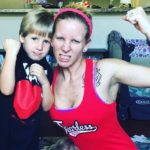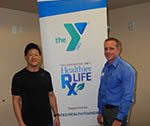I just recently started exercising again after a little bit of a break. The good news is that I have been able to sustain four to five days of exercise every week for a little over a month now, but my appetite has increased. I have only lost a little weight and I really don’t want to eat more, but these hunger cravings are difficult to control. What types of food should I be eating to help control these cravings and also maintain healthy weight loss? -Travis Warren Cook
Coach Cynthia’s Answer:
The healthiest and most effective way to provide your body with nutrients and the energy it needs to sustain a 3-4/week workout schedule is to focus on three things: protein, veggies and water. Small amounts of protein throughout the day will aid in curbing those intense cravings. The one thing you should absolutely NOT do is cut back on your food/caloric intake. Calories are units of energy. Should you deprive your body of this energy, it will break down. You’ll notice workouts getting harder, fatigue setting in sooner, and you will need longer to recover. The notion that losing pounds equals success is incorrect. If your workouts are effective, you may not see much of a difference on the scale. While your body burns fat, it is gaining muscle simultaneously. Try focusing on inches lost or body fat percentage loss/muscle gain instead. The scale is not an accurate unit of measurement when it comes to fitness or an overall indicator of great health.
 About Coach Cynthia
About Coach Cynthia
Cynthia Wagner is an ISSA Certified Fitness Trainer with a deep passion for nutrition and overall health and wellness. Cynthia is also the head trainer and coach at Orange Theory Fitness, training groups through a 60-minute, heart-rate-monitored EPOC workout. She also serves as the Director of Communications for the Central Florida Wellness Council.
Coach Andrés’ Answer:
Taking a break from running from time to time is always a good idea. These periods of rest allow the body to rest, recover and return stronger the next year. It’s only natural when you begin a new exercise regimen that you notice an increase in appetite. Although you are exercising, you should be very careful not to indulge in eating junk food because it’s easy and fast. I personally precook my lunches on the weekend, that way when I’m at work I avoid eating fast junk food as well as save money. As a rule of thumb, I eat my carbohydrates in the morning or afternoon and avoid consuming them at night. Carbs are high in energy, and if you don’t burn them off during the day your body will store them as fat as you sleep. The quality of food you eat is important as well. I will always opt to eat a home-cooked meal; they are healthier and, generally speaking, more nutritious. Eating good, healthy fats such as avocados and omega 3 fish oils also could help you burn fat easier during your workouts.
Eating smaller meals more often throughout the day will help in satisfying your hunger. I prefer to split my lunch in half, eating my first lunch from 10:30-11:30 a.m. and my second from 2:30-3:30 p.m. This keeps fueling my body throughout the day, and it increases my metabolism. The more frequently I eat, the less my body holds on to fat for fuel later. It realizes that my next meal will be within the next 2-3 hours and in return causes me to burn more fat. An example of a day of eating will look like this:
Breakfast 7:30 a.m. – 2 whole organic eggs (protein), 2 servings of vegetables (maybe in an omelet) and carbs (quinoa, granola, oatmeal, etc.).
Lunch 1. 11:30 a.m. – 4 oz. of protein (organic chicken, fish, organic beef – rarely) , 1 handful of carbs (brown rice, quinoa, sweet potatoes), 2 servings of vegetables, and 1 serving of fat (handful of nuts, avocado, tablespoon of nut butter).
Lunch 2. 2:30 p.m. – 4 oz. of protein (organic chicken, fish, organic beef – rarely) , 1 handful of carbs (brown rice, quinoa, sweet potatoes), 2 servings of vegetables, and 1 serving of fat (handful of nuts, avocado, tablespoon of nut butter).
Dinner – 4 oz. of protein, 2 servings of vegetables, and occasionally 1 serving of carbs, but I try to avoid a lot of carbs at night.
The further you get into your exercise routine, you may notice your body becomes more efficient at burning calories and you may not be as hungry. If you are training for a marathon, the longer your runs are, the more calories you are going to need to get you through your training. Occasionally, I will do a fasting run, where I wake up early in the morning and run on an empty stomach. This will help the body become a more efficient fat burner as well. Stay true to your plan, and you will lose the weight; it is always a little difficult to start once you’ve rested for a few weeks, but stick with it and you will see results.
About Coach Andrés
Dr. Andrés I Pérez was born in San Juan, Puerto Rico. He graduated from the University of Puerto Rico, Rio Piedras with a bachelor in sciences and received the degree of Doctor of Chiropractic from the Palmer College of Chiropractic. Dr. Andrés is passionate about healthy living, exercise and nutrition. An avid triathlete/marathon runner, he spends his weekends swimming, cycling and running. Major athletic accomplishments include finishing four Ironman events in under 10:48, running a 2:55 marathon, and running the Boston Marathon twice.
East Orange Wellness and Injury
3020 Lamberton Blvd., Suite 105, Orlando, FL 32832
407-382-2425 | OrangeWellness.com | email: aip2479@gmail.com
Coach Liliana’s Answer:
As your exercise increases, you need to make sure you are fueling your body properly for that increase. Try to make good choices that will help fuel that workout or help recover from it. Regarding the weight loss, you need to establish your priority. Are you exercising for the sole purpose of losing weight? Are you exercising to build lean muscle? For both reasons? Once you answer these questions, then you can build a nutrition plan that will target your goal.
There is no one-size-fits-all nutrition plan. However, eating clean is a good start! Make sure you have a balanced diet and you are hitting your macronutrient targets.
Good luck and welcome back to the exercise world!
About Coach Liliana
Liliana Pickens is an RRCA Certified Running Coach and Head Coach for Lake Nona Run Club. She enjoys helping athletes of all abilities reach their full potential. She has run countless half marathons, 10+ marathons and participated in triathlons. She works full time at Matosantos International Corporation as an Inventory Analyst. She is also the mother of three boys, ages 17, 14 and 11.






